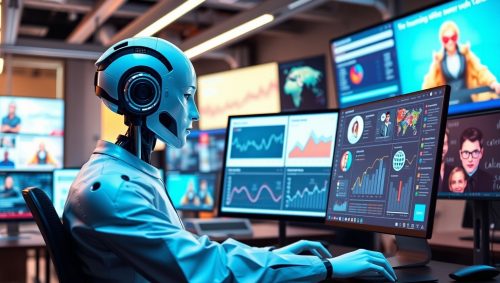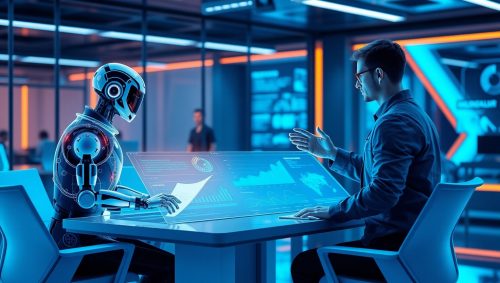How Autonomous AI Will Redefine Work, Creativity, and Everyday Life
AI has moved beyond simple chatbots and virtual assistants. The new generation of AI agents often referred to as “agentic AI” are capable of not only understanding natural language but also autonomously executing multi-step tasks with minimal human oversight. From scheduling appointments to automating software development, these intelligent systems are poised to become indispensable across sectors. In the next few sections, we delve into the key trends shaping the future of AI agents in 2025, providing both broad overviews and detailed insights for decision-makers.
Understanding AI Agents
What Are AI Agents?
AI agents are sophisticated software programs that operate independently to accomplish specific tasks or workflows. Unlike traditional AI tools that require constant user intervention, these agents leverage advanced machine learning models—such as large language models (LLMs)—to plan, execute, and even monitor tasks in real time. Their abilities range from simple automation (like data entry) to more complex functions such as predictive maintenance, scheduling, and customer engagement.
Key Characteristics:
- Autonomy: Ability to break down high-level goals into actionable steps.
- Interoperability: Seamless integration with existing digital systems.
- Adaptability: Learning from new data and continuously refining their performance.
- Collaboration: Working in tandem with human teams and other AI agents for optimal outcomes.
This evolution toward more autonomous and adaptive systems is what many experts describe as a paradigm shift in artificial intelligence. With the integration of real-time reasoning and decision-making capabilities, AI agents are transitioning from passive tools to proactive collaborators in the digital workplace.
Key Trends in AI Agents for 2025
1. Increased Autonomy and the Rise of Agentic AI
One of the most significant trends is the shift from basic, prompt-driven chatbots to fully autonomous, agentic AI. These systems are designed to take on complex tasks by interpreting vague instructions and breaking them down into actionable workflows. For instance, Nvidia CEO Jensen Huang recently predicted that 2025 will mark a pivotal year where AI agents become mainstream, capable of executing multistep tasks such as software engineering and digital marketing activities with minimal human input
What This Means:
- Enhanced Productivity: Knowledge workers may soon rely on AI agents to handle routine tasks, freeing up time for more strategic activities.
- Cost Efficiency: By automating repetitive functions, businesses can reduce operational costs and reallocate resources to innovation.
- Innovation Catalyst: With agents handling mundane tasks, employees can focus on creative problem-solving, driving overall business growth.
2. Seamless Integration with Business Workflows
In 2025, AI agents will no longer be isolated tools but will be deeply embedded into enterprise systems. From customer relationship management (CRM) to enterprise resource planning (ERP), companies are increasingly adopting AI solutions to enhance operational efficiency. According to insights from Forbes, specialized AI agents are being tailored for industries such as finance, healthcare, and manufacturing to automate complex workflows
Business Applications:
- Digital Marketing: AI agents will analyze customer data to provide hyper-personalized advertising and real-time engagement strategies.
- Customer Service: Autonomous agents will handle inquiries, provide troubleshooting support, and even predict customer needs, thereby improving satisfaction and loyalty.
- Software Development: Agents capable of generating, reviewing, and debugging code will accelerate product development cycles.
3. Enhanced Human-AI Collaboration

While the autonomy of AI agents is increasing, the role of human oversight remains crucial. The most successful deployments of agentic AI will likely involve a collaborative model where humans and AI work side-by-side. This “co-pilot” approach ensures that while AI agents manage routine tasks, humans can focus on strategic decision-making and creative problem solving.
Collaboration Benefits:
- Error Reduction: Human oversight helps catch errors or biases that AI might introduce, ensuring higher quality outputs.
- Skill Augmentation: AI agents can support employees by handling data-intensive tasks, allowing human talent to focus on innovation.
- Continuous Improvement: Feedback loops between humans and AI systems facilitate ongoing learning and system refinement.
Experts at Davos have even suggested that future workplaces will integrate AI agents as full-time collaborators rather than mere assistants, fundamentally changing how organizations operate
4. Specialization Across Industries
AI agents are not a one-size-fits-all solution. As technology advances, we can expect to see specialized AI agents designed to cater to the unique needs of different industries. For example:
- Healthcare: AI agents may manage appointment scheduling, patient monitoring, and even provide preliminary diagnostic support.
- Finance: In the financial sector, agents could automate tasks ranging from risk assessment to fraud detection and even complex trading strategies.
- Manufacturing: Predictive maintenance bots will help ensure machinery uptime by autonomously identifying and addressing potential issues.
- Retail: Personalized shopping assistants will revolutionize the customer experience by offering tailored recommendations and seamless service interactions.
A recent report by MarTech highlights that in the realm of marketing, agentic AI will enable hyper-personalized experiences that drive customer engagement and loyalty
5. Focus on Security, Governance, and Regulation
As AI agents become more autonomous and deeply integrated into critical business processes, concerns around data security, ethical governance, and regulatory compliance will intensify. Regulatory bodies around the world are already preparing frameworks—such as the E.U.’s AI Act—to address the potential risks associated with autonomous systems.
Key Considerations:
- Data Privacy: With AI agents accessing sensitive information, robust data protection measures must be enforced.
- Ethical Standards: Organizations will need to establish clear guidelines to ensure that AI behavior aligns with ethical and societal norms.
- Accountability: As AI systems become more autonomous, mechanisms for oversight and accountability must be developed to mitigate risks associated with erroneous or biased decision-making.
The future of AI agents will depend not only on technological advancements but also on the successful integration of these systems into secure and ethical operational frameworks
6. Emergence of Unified AI Ecosystems
Another notable trend is the move toward unified AI ecosystems, where multiple AI agents and tools work together cohesively. Instead of isolated applications, businesses will adopt platforms that orchestrate various AI functionalities—combining machine learning, natural language processing, and autonomous action into a single, integrated system. This convergence will drive more efficient, end-to-end automation across business functions.
Advantages of Unified Ecosystems:
- Streamlined Processes: Integrated systems reduce friction between different AI tools, leading to smoother workflows.
- Scalability: A unified platform allows businesses to scale AI operations more effectively without significant increases in overhead.
- Innovation Acceleration: With different AI agents collaborating seamlessly, companies can unlock new possibilities for automation and digital transformation.
Recent trends in digital transformation underscore the importance of creating coherent AI infrastructures that not only deploy advanced capabilities but also integrate them in a manner that enhances overall business performance
Implications for Business and Industry

Boosting Productivity and Efficiency
AI agents are poised to become the digital workforce of the future. By automating routine tasks and managing complex workflows, these systems will dramatically improve productivity across various sectors. For example, in software engineering, AI agents that generate and debug code can reduce development cycles, while in customer service, autonomous chatbots can handle a large volume of inquiries around the clock.
Real-World Examples:
- Software Engineering: Companies are already experimenting with AI tools that can produce code, identify bugs, and even optimize existing software—all with minimal human intervention.
- Digital Marketing: AI agents can analyze vast datasets to create personalized marketing campaigns, adjust strategies in real time, and ultimately drive higher conversion rates.
- Manufacturing and Logistics: Predictive maintenance bots and AI-driven supply chain management tools are helping companies reduce downtime and optimize inventory management.
Enhancing Competitive Advantage
Early adopters of agentic AI are likely to gain a significant competitive edge. Businesses that integrate these advanced systems into their operations will be able to respond more swiftly to market changes, innovate faster, and offer superior customer experiences. This, in turn, can lead to increased revenue and market share.
Strategic Considerations:
- Investment in Technology: As Nvidia CEO Jensen Huang pointed out, increased adoption of AI agents will drive demand for high-performance computing hardware. This trend not only benefits tech companies but also signals a broader shift in how businesses allocate their IT budget.
- Workforce Transformation: With AI handling repetitive tasks, employees can focus on creative and strategic functions, thereby transforming the nature of work and driving organizational growth.
- Scalable Solutions: The ability to scale AI applications seamlessly across various departments and locations will enable enterprises to maintain operational efficiency even as they expand.
Navigating Ethical and Security Challenges
With great power comes great responsibility. As AI agents become more integrated into critical business processes, addressing ethical and security challenges will be paramount. Enterprises must balance the drive for innovation with the need to protect sensitive data and ensure that AI decisions are transparent and accountable.
Key Challenges:
- Bias and Fairness: AI systems are only as good as the data they are trained on. Ensuring that these systems do not perpetuate existing biases requires continuous monitoring and refinement.
- Job Displacement: While AI agents promise to augment human capabilities, there is also concern over potential job displacement. Companies must invest in upskilling and reskilling programs to prepare employees for a future where human-AI collaboration is the norm.
- Regulatory Compliance: Navigating a patchwork of global regulations will be challenging. Enterprises must be proactive in implementing robust governance frameworks that adhere to emerging standards.
Actionable Takeaways for Enterprises
For business leaders looking to capitalize on the opportunities presented by AI agents in 2025, here are some strategic recommendations:
- Invest in AI Infrastructure:
- Upgrade computing resources to support advanced AI workloads.
- Explore partnerships with technology providers (e.g., NVIDIA, OpenAI) to access cutting-edge AI models and hardware.
- Foster a Culture of Continuous Learning:
- Launch internal training programs to upskill employees in AI literacy.
- Encourage a collaborative environment where humans and AI agents work side-by-side.
- Develop and Deploy Pilot Projects:
- Start with small-scale implementations in non-critical areas to test the viability of AI agents.
- Use pilot projects as a learning tool to refine integration strategies before scaling up.
- Implement Robust Governance Frameworks:
- Establish clear ethical guidelines and accountability measures for AI deployment.
- Monitor AI performance regularly to ensure decisions remain fair, transparent, and aligned with business objectives.
- Leverage Unified AI Ecosystems:
- Seek solutions that integrate multiple AI functionalities into a cohesive platform.
- Focus on systems that offer interoperability and scalability to future-proof your operations.
- Engage with Regulatory Developments:
- Stay informed about new regulations (such as the E.U.’s AI Act) and adjust policies accordingly.
- Participate in industry forums and collaborations to help shape the future of AI governance.
By taking these steps, companies can not only harness the power of AI agents to drive efficiency and innovation but also position themselves as leaders in the digital transformation era.
Conclusion
The future of AI agents in 2025 is bright and brimming with opportunity. From the rise of autonomous, agentic AI systems to their deep integration into business workflows, the next year promises to be transformative. As enterprises embrace these advanced technologies, they will unlock new levels of productivity, efficiency, and competitive advantage.
However, this journey will not be without its challenges. Ethical considerations, security risks, and the need for robust governance frameworks will require careful attention. By investing in technology, fostering a culture of continuous learning, and implementing strategic pilot projects, business leaders can navigate this complex landscape successfully.
As we stand on the cusp of this exciting era, now is the time to explore, experiment, and invest in AI agents. The companies that act decisively today will be the pioneers of tomorrow’s digital economy. Stay informed, plan strategically, and get ready to lead your organization into the future of AI-driven innovation.
FAQs About AI Agents in 2025
Q: Will AI agents replace jobs?
A: No, they’ll augment roles. For example, legal agents handle contract reviews, letting lawyers focus on client strategy.
Q: How can small businesses leverage AI agents?
A: Use no-code platforms to automate your workflows.
Q: Are AI agents secure?
A: Risks exist, but agents like Salesforce’s Inspector AI monitor anomalies 24/7, ensuring safer operations.


